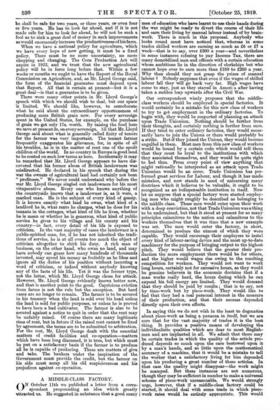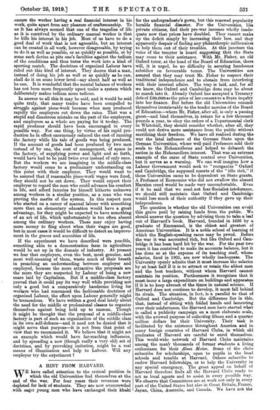A MIDDLE-CLASS FACTORY.
IN October 11th we published a letter from a correl_l spondent propounding an idea which greatly attracted us. He suggested in substance that a good many men of education •who have learnt to use their hands during the war might be ready to divert the course of their life and earn their living by manual labour instead of by brainwork. There is much in this proposal. Anybody who looks round must have noticed that, whereas in some trades skilled workers are earning as much as £6 or £7 a week—that is to say, over £300 a year—and nevertheless in some instances refusing to pay Income Tax, there are many demobilized men and officers with a certain education whose ambitions lie in the direction of clerkships but who cannot hope ever to earn more than £160 to £250 a year. Why then should they not grasp the prizes of manual labour ? Nobody supposes that even if the wages of skilled labour fall they will go back very. far. High wages have i come to stay, just as they stayed in America after having taken a sudden leap upwards after the Civil War.
Our eorrespondent wisely proposes that the middleclass workers should be employed in special factories. It would certainly be a mistake for this new class of workers to try to get employment in the ordinary factories. To begin with, they would be suspected of planning an attaok upon Trade Unionism. Nothing should be further from their thoughts, and certainly nothing is further from ours. If they tried to enter ordinary factories, they would necessarily have to join the Unions or there would probably be a strike. But if they joined the Unions, they would become engulfed in them. Most men from this new class of workers would' be bound by a certain codewhich would tell them that they must be loyal to the institutions with. which they associated themselves, and they would be quite right to feel thus. From every point of view anything that might rationally be interpreted as an attack upon Trade Unionism would be an error. Trade Unionism has performed great services for Labour, and though it has made mistakes,. and now stands in need of unlearning many doctrines which it believes to be valuable, it oughtto be recognized as an indispensable instit,ut,ion in itself. Now let us suppose that a special factory were started employing men who might, roughly be described as belonging to the middle class. These men would enter upon their work with a deep conviction, not that Trade Unionism was a thing to be undermined, but that it stood at present for so many principles calamitous to' the nation and calamitous to the workers themselves that it was time that a new example was set. The men would enter the factory, in short, determined to produce the utmost of which they were capable. They would encourage their employers to instal every kind of labour-saving device and the most up-to-date machinery for the purpose of bringing output to the highest pitch. They would believe that the greater their production the more employment there would be for others, and the higher would wages rise owing to the resulting competition for workers. They would not want to work long hours, certainly, not for excessive hours, as they would be genuine believers in the economic doctrine that if a man works really hard, the hours during which• he can expend his full energy are. limited. They would demand that they should be paid by results.; that is to say, not by time-work but by piece-work. They Would, like to feel that they had a real personal interest in the measure of their production, and that their success depended directly upon their 'own efforts.
In saying this we do not wish in the least to dogmatize about piece-work as being apanacea in itself, but we are sure that for the vast majority of trades it is the best thing. It provides a positive means of developing the individualistic qualities which are dear to most Englishmen and are implanted in all. We admit that there may be certain trades in which the quality of the article produced depends so much upon the care bestowed upon it by a man's hands, and so little upon the mathematical accuracy of a machine, that it would be a mistake to tell the worker that a satisfactory living for him depended upon his producing a great number of these articles. In that case the quality might disappear—the work might be stamped. But these instances are not numerous, though they may be sufficient in number to make a universal scheme of piece-work unreasonable. We would strongly urge, however, that if a middle-class factory could be started, it should deal with some trade in whichpiecework rates would be entirely appropriate. This would 'maul* the worker having 's real financial interest in his work, quite apart from any pleasure of craftsmanship. To us it has always seemed that one of the tragedies of life as it is contrived by the ordinary manual worker is that he kills his interest in his iob. Most of us have to do a good deal of work that is not agreeable, but an interest can be created in all work, however disagreeable, by trying to do it as well as possible, or as quickly as possible, or by some such device as pits one's faculties against the tedium of the conditions and thus turns the work into a kind of sporting match. The doctrines of organized Labour have ruled out this kind of interest. They decree that a man, instead of doing his job as well or as quickly as he can, shall do it on some lower level—say about half As well as he can. It is wonderful that the mental balance of workers has not been more frequently upset under a system which deliberately makes tedium more tedious.
In answer to all this it may be said, and it would be said quite truly, that many trades have been compelled to struggle against piece-work because when men produced rapidly the employers cut down the rates. That was a stupid and disastrous mistake on the part of the employers, and employers as a whole are paying for it to-day. The rapid producer should have been encouraged in every possible way. For one thing, by virtue of his rapid production he in effect enormously reduced the cost of running the factory while his tale of goods was being produced. If the amount of goods had been produced by two men instead of by one, the cost of management, of space in the factory, of supplying power and light and so forth, would have had to be paid twice over instead of only once. But the workers we are imagining in the middle-class factory would come to a preliminary understanding on this point with their employer. They would want to be assured that if reasonable piece-work wages were fixed, they should not be cut down. They would expect their employer to regard the man who could advance his comfort in life, and afford luxuries for himself hitherto unknown among workers in a similar position, as a man who was proving the merits of the system. In this respect men who started on a career of manual labour with something more than an elementary education would have a great advantage, for they might be expected to have something of an art of life, which unfortunately is too often absent among the ordinary workers. These may enjoy having more money to fling about when their wages are good, but in most cases-it would be difficult• to detect an improvement in the graces and amenities of life.
If the experiment we have described were possible, something akin to a demonstration farm in agriculture would be set up in the domain of industry. At present we fear that employers, even the best, most genuine, and most well-meaning of them, waste much of their breath in preaching an understanding between employer and employed, because the more attractive the proposals are the more they are suspected by Labour of being a new snare laid by Capitalism. But if a middle-class 'factory proved that it could pay its way well while providing not only a good but a comparatively handsome living for workers who had renounced the fashionable doctrines of organized Labour, the effect upon Labour generally might be tremendous. We have •written a good deal lately about the need for the middle or professional classes to organize themselves against being held up to ransom. Though it might be thought that the proposal of a middle-class factory is part of such an. organization of the middle class in its own self-defence—and it need not be denied that it might serve that purpose—it is not from that point of view that we recommend it. We believe that it might set an example which would have far-reaching influences, and by spreading a new (though really a very old) set of • doctrines, and by provoking imitation, might be a real means of illumination and help to Labour. Will any employer try the experiment ?











































 Previous page
Previous page